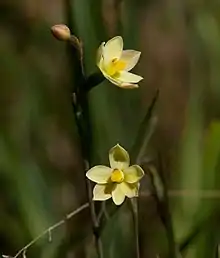| Twisted sun orchid | |
|---|---|
 | |
| Thelymitra flexuosa near Pearcedale | |
| Scientific classification | |
| Kingdom: | Plantae |
| Clade: | Tracheophytes |
| Clade: | Angiosperms |
| Clade: | Monocots |
| Order: | Asparagales |
| Family: | Orchidaceae |
| Subfamily: | Orchidoideae |
| Tribe: | Diurideae |
| Genus: | Thelymitra |
| Species: | T. flexuosa |
| Binomial name | |
| Thelymitra flexuosa | |
| Synonyms[1] | |
Thelymitra flexuosa, known as the twisted sun orchid,[2] is a species of orchid that is endemic to southern Australia. It has a single thin, wiry leaf and up to four cream-coloured to canary yellow flowers with four rows of short hairs on the back of the column. It is a common and widespread species, superficially similar to T. antennifera.
Description
Thelymitra flexuosa is a tuberous, perennial herb with a single wiry, linear leaf 60–150 mm (2–6 in) long and 3–4 mm (0.1–0.2 in) wide. Up to four cream-coloured to canary yellow 10–15 mm (0.4–0.6 in) wide borne on a flowering stem 200–350 mm (8–10 in) tall. The sepals and petals are 5.5–7 mm (0.2–0.3 in) long and about 4 mm (0.2 in) wide. The labellum (the lowest petal) is shorter and narrower than the other petals and sepals. The column is white to cream-coloured, 4.5–5 mm (0.18–0.20 in) long and about 2.5 mm (0.1 in) wide with four lines of short hairs on its back. The lobe on the top of the anther is short with a few brown glands on its back. The side lobes are bright yellow and covered with short hairs. The flowers are short-lived, self-pollinating and open only slowly on hot, humid days. Flowering occurs from September to November.[2][3][4][5]
Taxonomy and naming
Thelymitra flexuosa was first formally described in 1839 by Stephan Endlicher and the description was published in Novarum Stirpium Decades.[6][7] The specific epithet (flexuosa) is a Latin word meaning "full of bends", "tortuous", "crooked" or "winding",[8]: 692 referring to the twisted or "zig-zagged" flowering stem.[5][9]
Distribution and habitat
The twisted sun orchid is widespread and common throughout its range. It grows with sedges and low shrubs in moist places such as the edge of swamps. It occurs in southern Victoria, south-eastern South Australia, Western Australia and Tasmania.[2][3][4] In Western Australia it is found between Kalbarri and Israelite Bay.[10][11][12]
References
- 1 2 "Thelymitra flexuosa". World Checklist of Selected Plant Families (WCSP). Royal Botanic Gardens, Kew.
- 1 2 3 Jones, David L. (2006). A complete guide to native orchids of Australia including the island territories. Frenchs Forest, N.S.W.: New Holland. p. 247. ISBN 1877069124.
- 1 2 Jeanes, Jeff. "Thelymitra flexuosa". Royal Botanic Gardens Victoria. Retrieved 30 May 2018.
- 1 2 "Thelymitra flexuosa". State Herbarium of South Australia. Retrieved 30 May 2018.
- 1 2 Mayfield, Enid (2010). Flora of the Otway plain & ranges (Volume 1) (2nd ed.). Collingwood, VIC: CSIRO Publishing. p. 178. ISBN 9780643098046.
- ↑ "Thelymitra flexuosa". Retrieved 30 May 2018.
- ↑ Endlicher, Stephan L.; Fenzl, Edouard (1839). Novarum Stirpium Decades No. 3. pp. 23–24. Retrieved 30 May 2018.
- ↑ Brown, Roland Wilbur (1956). The Composition of Scientific Words. Washington, D.C.: Smithsonian Institution Press. p. 139.
- ↑ Archer, William. "Thelymitra flexuosa". Esperance Wildflowers. Retrieved 30 May 2018.
- ↑ Brown, Andrew; Dundas, Pat; Dixon, Kingsley; Hopper, Stephen (2008). Orchids of Western Australia. Crawley, Western Australia: University of Western Australia Press. p. 436. ISBN 9780980296457.
- ↑ Hoffman, Noel; Brown, Andrew (2011). Orchids of South-West Australia (3rd ed.). Gooseberry Hill: Noel Hoffman. p. 299. ISBN 9780646562322.
- ↑ "Thelymitra flexuosa". FloraBase. Western Australian Government Department of Biodiversity, Conservation and Attractions.
External links
 Media related to Thelymitra flexuosa at Wikimedia Commons
Media related to Thelymitra flexuosa at Wikimedia Commons Data related to Thelymitra flexuosa at Wikispecies
Data related to Thelymitra flexuosa at Wikispecies